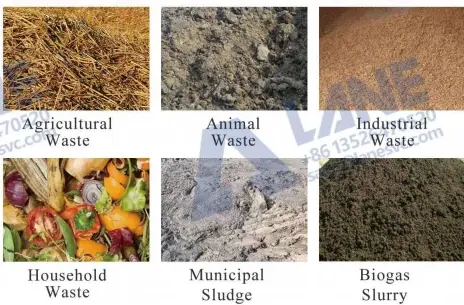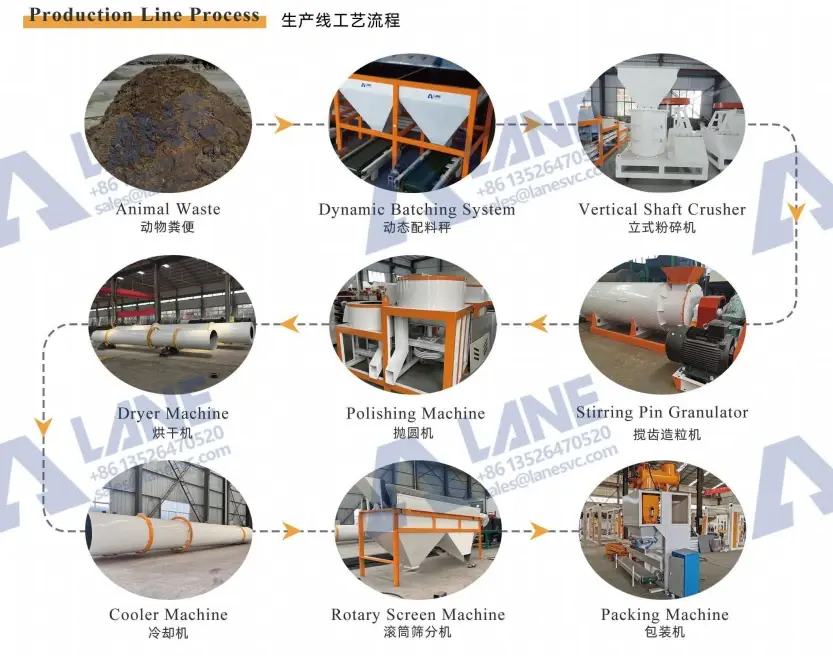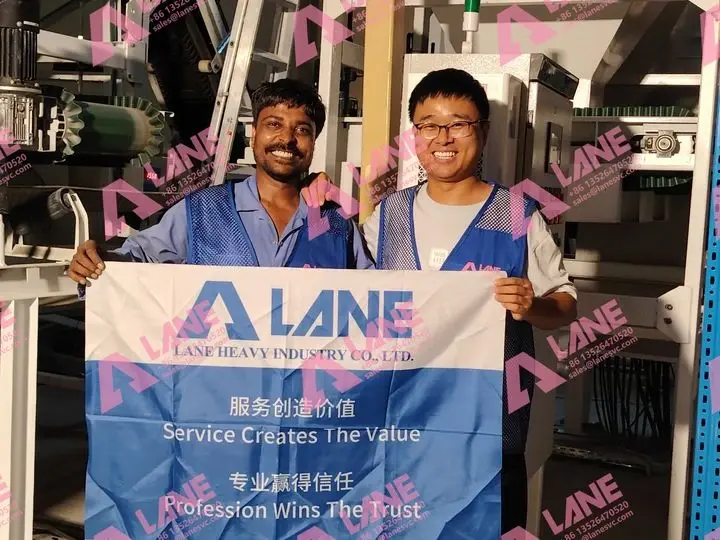Revolutionizing Agriculture: Bio-Organic Fertilizer Production from Agricultural Waste
- Efat Elahi
- Sep 2, 2025
- 4 min read
Bio-organic fertilizer production from agricultural waste is one of the most promising and sustainable approaches to meeting the growing global demand for food while protecting the environment. Rather than relying on synthetic fertilizers, which can harm the soil and water quality, farmers and producers are increasingly turning to agricultural waste as a resource. By converting waste materials into high-quality fertilizers, we can help reduce waste, improve soil health, and contribute to a more sustainable future.

In this article, we'll explore how bio-organic fertilizer production works, the key benefits of using agricultural waste for fertilizer, and how LANE's cutting-edge technology is helping farmers maximize the potential of waste-to-fertilizer systems.
What is Bio-Organic Fertilizer Production from Agricultural Waste?
Bio-organic fertilizer is a product made from decomposed agricultural waste, such as crop residues, animal manure, and other organic materials. The production process involves microbial decomposition, which breaks down these raw materials into stable organic matter rich in essential nutrients for plants.
Key Steps in Bio-Organic Fertilizer Production:
(1) Collection of Agricultural Waste: Agricultural by-products such as crop residues (straw, leaves), animal manure (chicken, cow), and food waste are collected as the starting point for the fertilizer production.
(2) Pre-treatment and Shredding: The waste materials are shredded or ground to reduce their size, making them easier to process. This step also helps to increase the surface area for microbial action.
(3) Fermentation: The shredded organic waste is then placed in a vertical fermentation tank or composting system where it undergoes microbial fermentation. This process helps break down complex organic matter into simpler compounds. The heat generated during fermentation also kills harmful pathogens.
(4) Mixing and Nutrient Adjustment: After fermentation, the organic matter is mixed with other nutrients or additives to balance the fertilizer's nutrient profile. This ensures that the final product has the correct nitrogen, phosphorus, potassium (NPK) ratio for various crops.
(5) Granulation: The composted material is then converted into granules using an stirring pin granulator. Granulation makes the fertilizer easier to handle, store, and apply, offering a more controlled release of nutrients to plants.
(6) Drying and Cooling: The granules are dried and cooled to reduce moisture content, making them suitable for long-term storage.
(7) Packaging: Finally, the fertilizer is packed into bags using an automatic packing machine. This step is fully automated to ensure precision in weight and quantity, making the entire process more efficient.

Advantages of Bio-Organic Fertilizer Production from Agricultural Waste
1. Sustainability at its Core
Agricultural waste is a renewable resource, and its utilization in fertilizer production reduces the need for chemical fertilizers, which are harmful to the environment. By recycling waste, we reduce landfill waste, prevent air pollution caused by burning crop residues, and contribute to a more sustainable agricultural ecosystem.
2. Soil Health and Crop Yield
Bio-organic fertilizers improve soil structure by adding organic matter, which enhances water retention, drainage, and aeration. These fertilizers also boost microbial activity in the soil, increasing its fertility over time. As a result, farmers see healthier crops and higher yields.
3. Cost-Efficiency
By producing fertilizers from waste materials available on-site, farmers can reduce their reliance on expensive chemical fertilizers. Moreover, this process offers a cost-effective solution for waste disposal and can be a lucrative business opportunity for farmers and producers.
4. Nutrient-Rich and Balanced
Unlike synthetic fertilizers, which often contain only a few key nutrients, bio-organic fertilizers are rich in a broader range of essential nutrients, including micronutrients and trace elements. This balance promotes more sustainable plant growth and long-term soil health.
LANE's Contribution to Efficient Bio-Organic Fertilizer Production
At LANE, we provide state-of-the-art solutions for bio-organic fertilizer production from agricultural waste. Our equipment and technology are designed to make the production process more efficient, cost-effective, and environmentally friendly.
1. Vertical Fermentation Tank
Our vertical fermentation tank ensures a faster and more controlled fermentation process. With advanced aeration systems, temperature controls, and moisture regulation, the tanks provide an optimal environment for microbial action, resulting in high-quality compost in less time.
2. Compost Turners
LANE’s crawler type compost turner and groove type compost turner are designed for large-scale operations. These turners ensure uniform mixing and aeration, speeding up the decomposition process and reducing the need for manual labor.
3. Granulation Systems
Our stirring pin granulators produce uniform, high-quality fertilizer granules that can be easily stored and applied. The granulation process enhances the fertilizer’s nutrient release and ensures that plants receive a steady supply of nutrients over time.
4. Automated Packing Systems
The final product is packaged with precision using our automatic packing machine, which ensures accuracy in weight and eliminates human error. This increases efficiency and makes the packaging process faster and more reliable.
As the world moves towards more sustainable farming practices, bio-organic fertilizer production from agricultural waste is set to become a key part of the agricultural landscape. With advances in technology, farmers can efficiently convert waste into valuable fertilizer, benefiting both their crops and the environment.
At LANE, we continue to innovate and provide farmers with the tools they need to maximize waste-to-fertilizer processes. Our comprehensive solutions help optimize efficiency, reduce costs, and ensure a more sustainable approach to agriculture.

Email: sales@lanesvc.com
Contact number: +86 13526470520
Whatsapp: +86 13526470520






Comments